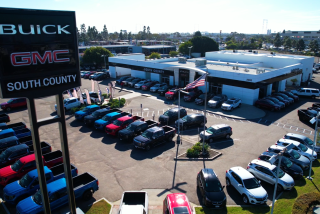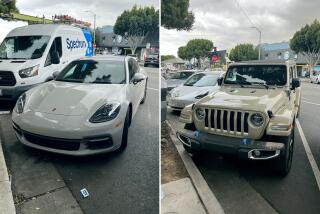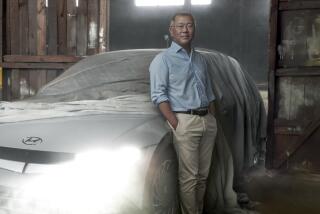Hyundai Gears Ad Campaign to Its Expanded Line : Marketing: After two years of slumping sales, the auto maker with a reputation as a producer of cheap cars focuses on an upscale image and products.
- Share via
IRVINE — Hyundai Motor America on Wednesday unveiled a new national advertising campaign that focuses on its new Italian-design Scoupe sports coupe and, to a lesser extent, its mid-size, top-of the-line Sonata.
The campaign, whose slogan is “Hyundai. Yes Hyundai,” is a subtle appeal to U.S. consumers to give its expanded product line a second look. The ads, which will begin appearing Monday, come in the wake of two years of slumping sales.
While the pitch is not blatant, the message is clear.
The Scoupe, for example, is presented in one set of television and print ads as a head-turning car that “will do wonders for your image--and ours.”
The second reference, of course, is to Hyundai’s longstanding reputation as a maker of “inexpensive, cheap cars,” including its mainstay Excel, said Harry Grusche, a senior vice president of Hyundai’s ad agency, Backer Spielvogel Bates Inc.
In another television ad, for Hyundai’s Sonata, the entire focus is on the model’s optional leather upholstery and dash-mounted compact disc player. The vehicle is shown only briefly, in a pull-away shot at the end of the spot as the announcer, in a voice radiating confidence and pride, intones the South Korean car makers’ new slogan.
Grusche said the campaign will be largely television-oriented, with four Scoupe ads and one Sonata spot. The print campaign, in 25 national magazines beginning late this month, will feature three Sonata and three Scoupe ads. And two 60-second radio spots will run for each model in the lineup--Excel, Scoupe and Sonata.
Hyundai has not yet established an advertising budget for 1991 but will almost certainly spend more than in the current year, said Rod Hayden, vice president and chief operating officer of Hyundai Motor America--the car maker’s Fountain Valley-based U.S. importer and distributor. This year’s budget has been estimated by industry sources at about $100 million.
New York-based Backer Spielvogel, Hyundai’s sole U.S. ad agency since the car maker began selling in the U.S. market, set up its 80-person office in Irvine specifically to handle Hyundai’s ad needs.
That office, which created Hyundai’s successful “Cars That Make Sense” campaign when the Excel first appeared on the market in 1986, developed the new national campaign to assist Hyundai in its drive to reposition itself in the market as a car maker with several models that offer not only value but quality as well.
“We have to persuade the buyers that Hyundai has the technological advances and luxury touches to compete with cars from Japan,” Grusche said.
To do that, Hyundai is dropping its emphasis on low price in its corporate ad campaign--leaving that avenue to its dealers, who advertise individually and in regional campaigns paid for by local dealer associations.
Because Hyundai took three years to introduce its second model, the Sonata, the entry-level pool had begun drying up. Potential buyers, with no other Hyundai products to look at, shopped other makes, making it even harder for Hyundai dealers to make money.
A number of early dealers quit the franchise, and although the total number has continued to grow, to 360 now, Hayden estimated that only about 45% of Hyundai’s dealers are profitable--the same percentage most other car makers report.
Hayden said Hyundai previewed the ad campaign to dealers last week and got a favorable reception.
The campaign, he said, helped persuade the dealers that the company does have a plan to help recapture some of the sales that made it the most successful new import car in U.S. history.
Hyundai will mention prices in its ads, but no longer in blazing headlines. And while it currently is caught up in the rebate and low interest frenzy ripping through the auto retailing world, the company has no plans to offer rebates or other incentives to buyers of its 1991 models--at least, Hayden said, until other makers start offering incentives on their 1991s.
Instead of the dollars consumers can save by buying Hyundais--the focal point of the ad campaigns when the Excel was the only model Hyundai sold--the new ads talk about power-assisted disc brakes, four-speed automatic transmissions, power windows and mirrors, compact disc players, high output stereo systems, cruise controls and even engine power.
While not pretending that Hyundais can run with the high-powered performance cars of most domestic and foreign manufacturers, Hyundai says in its ads that independent tests show that its V-6 Sonata goes from zero to 60 m.p.h. faster than the Ford Taurus L, Lexus ES250 and even the $70,000 BMW 751i.






